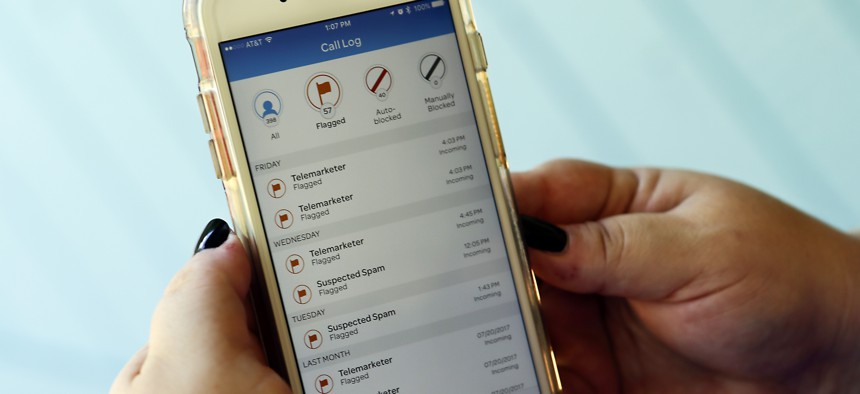Figuring Out How to Go After International Robocallers

This Aug. 1, 2017, file photo, shows a call log displayed via an AT&T app on a cellphone in Orlando, Fla. New tools are coming to help fight robocall scams, but don’t expect unwanted calls to disappear. John Raoux/AP Photo

Connecting state and local government leaders
The FCC will vote on a proposed rule next month that would ban malicious caller ID spoofing for text messages and robocalls that originate outside the United States. State attorneys general have long requested federal assistance with complaints about robocallers from out of the country.
The Federal Communications Commission is looking to take its war against robocalls overseas.
FCC Commissioner Ajit Pai announced Monday that the commission will consider a proposal to expand its ability to go after individuals behind international robocalls and malicious caller ID spoofing used in text messages.
Robocalls are increasingly originating outside the United States and the announcement comes after Congress adopted legislation last year giving the FCC authority to pursue enforcement action overseas.
“Call center fraudsters often pretend to be calling from trusted organizations and use pressure tactics to steal from Americans. We must attack this problem with every tool we have,” said FCC Chairman Ajit Pai. “With these new rules, we’ll close the loopholes that hamstring law enforcement when they try to pursue international scammers and scammers using text messaging.”
The exact text of the proposed rule will be released Thursday and the FCC will vote on the matter on August 1.
Federal action on robocalls from outside the country has long been sought by state attorneys general, who’ve complained their offices lack jurisdiction when they get complaints about calls originating in other countries. Forty-two AGs wrote to the FCC earlier this year in support of broadening the commission’s authority to go after malicious foreign actors.
“[T]he State Attorneys General encourage the Commission to adopt the rules, and also offer our continued support of a proactive, multi-pronged approach to battle the noxious intrusion of illegal robocalls, as well as malicious caller ID spoofing in voice, alternative voice, and text message services,” the coalition of attorneys general wrote in comments submitted to the FCC in May.
Americans receive more than 5 billion robocalls each month, and the FCC’s action comes as the public and consumer protection groups have increasingly urged both the FCC and Congress to crack down on scam calls. Scammers can use spoofed phone numbers to make calls or messages appear to come from a customer’s area code or a familiar phone number and many are used as a vehicle for nefarious actors to seek access to customers’ personal data.
The FCC has the ability to go after the perpetrators of domestic malicious robocalls under the Truth in Caller Act of 2009. But it was not until Congress passed the RAY BAUM’S Act last year that the FCC was given the authority to pursue enforcement action against those initiating robocalls abroad and those who use spoofed phone numbers in text messages.
A notice of proposed rulemaking issued by the FCC in February highlighted the desire to expand its ability to target overseas actors.
“Incorporating this statutory change into our Truth in Caller ID rules will allow us to bring enforcement actions that allege both statutory and rule violations against bad actors who seek out victims in this country, regardless of where the communications originate,” the notice said.
FCC authorities looking into robocall complaints have too often had to drop investigations after discovering that a perpetrator is located overseas, said an FCC official who spoke to reporters on background Monday.
The FCC has taken a number of actions in recent months to target fraudsters perpetrating robocalls.
FCC voted last month to allow telecom companies, like Sprint and AT&T, to automatically enroll consumers in call-blocking programs that weed out suspected spam calls. Under that adopted rule, consumers can also opt in to more aggressive call-blocking services by allowing carriers to block all calls not emanating from a pre-approved list or address book.
The FCC also advanced a proposal last month that would require carriers to implement new protocols to distinguish between legitimate calls. Under the proposal, the FCC would require carriers to implement the SHAKEN/STIR caller ID authentication framework by the end of the year.
Telecom companies are expected to provide an update on their ability to implement the technology at an FCC summit Thursday.
Andrea Noble is a staff correspondent for Route Fifty.

NEXT STORY: Pollution in the Northeast Disproportionately Affects Communities of Color




